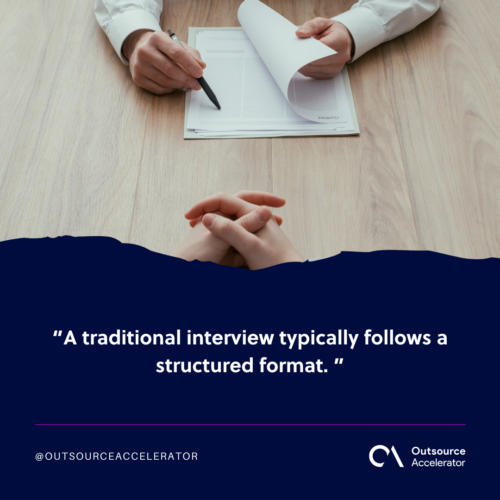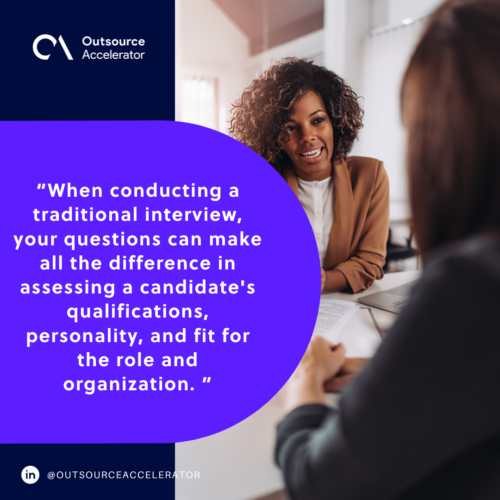What is a traditional interview?

A traditional interview is a cornerstone of the recruitment process in the hiring world.
But what exactly is it, and how does it compare to other interview formats? How can recruiters and headhunters prepare for this crucial encounter, and what questions should they ask?
This article delves into a traditional interview, exploring its definition, preparation strategies, the right questions to ask candidates and the types of interview formats.
Traditional interview defined
Picture this: You’re sitting in a well-lit room, facing an interviewer eager to learn about your qualifications, experiences, and personality.
This classic scenario defines the traditional interview as a time-tested method of assessing potential candidates for a job position. But what makes this form of interview so enduring?
A traditional interview typically follows a structured format. It begins with an introduction, where the interviewer and interviewee exchange pleasantries.
Then comes the heart of the interview, where questions flow back and forth, allowing the interviewer to gain valuable insights into the candidate’s skills and personality.

Traditional vs. Behavioral interview
Before diving deeper, it’s essential to distinguish between traditional and behavioral interviews.
In a traditional interview, questions are typically open-ended, inviting candidates to share their experiences, qualifications, and aspirations.
On the other hand, behavioral interviews focus on past behavior as a predictor of future performance.
Understanding this difference is crucial for recruiters to select the most suitable interview format.
How recruiters and headhunters prepare for a traditional interview
Recruiters and headhunters have an important role in the traditional interview process. Their expertise in identifying and evaluating talent is crucial in finding the right fit for organizations.
A traditional interview commonly comprises the following steps:
Client briefing
The first step in finding the perfect candidate, recruiters and headhunters engage in a comprehensive client briefing.
This crucial step involves understanding the client’s specific requirements, job role, company culture, and the qualifications needed in a candidate.
It’s akin to setting the compass’s direction before venturing into the recruitment landscape.
Candidate sourcing
Once armed with a clear client brief, recruiters and headhunters initiate candidate sourcing. The goal is to create a diverse pool of talent to choose from.
Recruiters or headhunters use multiple channels to find potential talents, like:
- Job boards
- Social media
- Professional networks
- Industry contacts
Resume screening
With a pool of candidates, the next step is to perform resume screening.
Recruiters and headhunters meticulously review resumes to ensure that candidates meet the basic qualifications and requirements specified by the client.
This process helps in shortlisting candidates who align with the job description.
Interview scheduling
Conducting traditional interviews can be complex, especially when managing multiple candidates and busy schedules.
Recruiters and headhunters are responsible for coordinating interviews between clients and candidates. This includes finding suitable time slots, arranging interview locations, and ensuring everyone is well-informed about the details.
Interview and evaluate the candidate
Finally, the day of the traditional interview arrives. Recruiters and headhunters facilitate the interview process.
Both might participate in interviews to observe and assess candidates, ensuring the interview meets the client’s expectations.
This step is crucial in providing valuable feedback to both clients and candidates.
Questions to ask in a traditional interview
When conducting a traditional interview, your questions can make all the difference in assessing a candidate’s qualifications, personality, and fit for the role and organization.

Here are some key questions to consider:
Can you tell me more about yourself
“Can you tell me more about yourself” is often the opening question in a traditional interview. It serves as an icebreaker and allows candidates to introduce themselves.
Look for:
- Relevance. Is the candidate’s response focused on their professional background, skills, and experiences relevant to the job?
- Clarity. Does the candidate provide a concise but informative overview of their career journey?
- Passion. Are the candidates enthusiastic about their career and how it aligns with the position they’re applying for?
Why do you want to work here
Understanding a candidate’s motivation to join your organization is essential. The “Why do you want to work here?” question can reveal:
- Company research. Did the candidates do their homework on your organization? Look for mentions of specific aspects that attract them.
- Alignment. Do the candidates’ responses indicate alignment between their career goals and your company’s mission, culture, or values?
- Long-term commitment. Assess if the candidates see your organization as a place they’re genuinely interested in building a future with.
What are your strengths and weaknesses
Asking about “Strengths and Weaknesses” helps you understand a candidate’s self-awareness and ability to reflect on their qualities.
Look for:
- Self-awareness. Do they recognize their strengths and weaknesses accurately?
- Improvement. If discussing weaknesses, do they show a willingness to improve and grow?
- Relevance. Are their strengths and weaknesses relevant to the job role? Are their strengths aligned with what you’re looking for?
Where do you see yourself in [X] years
The “Where do you see yourself in [X] years?” question is crafted to evaluate a candidate’s future aspirations and the extent of their ambition.
- Ambition. Do their career goals align with your organization’s growth opportunities?
- Planning. Are they strategic in their thinking about career progression?
- Realism. Assess whether their goals are realistic and achievable within the context of your organization.
Types of interview formats
When conducting interviews, there are various formats, each with unique characteristics and advantages.
Let’s explore four common types of interview formats:
Panel interviews
Panel interviews consist of several interviewers from various departments or hierarchical positions within the company. This format provides a well-rounded perspective on the candidate.

Unstructured interviews
Unstructured interviews are more conversational and flexible.
Interviewers may ask open-ended questions based on the candidate’s responses, allowing for a deeper exploration of qualifications and personality.
Group interviews
Group interviews gather multiple candidates in a single session. This format helps assess teamwork, communication skills, and how candidates interact with others.
Utilize traditional interviews to evaluate candidates thoroughly
Traditional interviews remain a trusted method for evaluating candidates thoroughly. It allows digging deep into a candidate’s qualifications and personality, helping recruiters make informed decisions.
Utilizing traditional interviews to evaluate candidates thoroughly requires a well-structured and thoughtful approach.
By asking the right questions and using appropriate interview formats, recruiters and headhunters can identify the best-fit candidates for their clients.







 Independent
Independent




